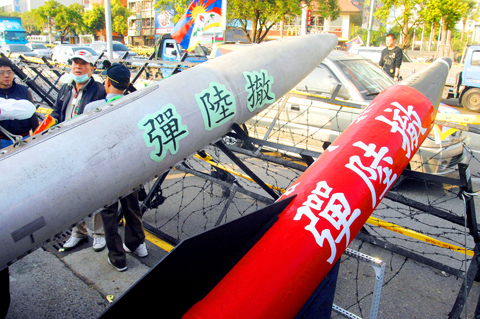Mainland Affairs Council (MAC) Chairwoman Lai Shin-yuan (賴幸媛) said she mentioned China’s military threat to Taiwan during her meeting with Beijing’s top cross-strait negotiator yesterday, and that she also emphasized the importance of governments winning the support of the public.
After meeting Association for Relations Across the Taiwan Strait (ARATS) Chairman Chen Yunlin (陳雲林) yesterday afternoon, Lai told reporters that during their closed-door meeting, she told him that cross-strait detente could not be reached under the shadow of military threat — especially missiles targeting Taiwan.
“It makes Taiwanese very uncomfortable and most of them oppose such a threat,” she said.

PHOTO: PATRICK LIN, AFP
Lai said political issues were not a priority in the cross-strait negotiations at the moment, adding that the government’s cross-strait policy is to proceed gradually and tackle the easier and more urgent issues before moving on to the more difficult and less pressing ones. Economic issues precede political ones, she said.
“The institutionalized negotiation system is the right way to go,” she said. “Public support is the most important element of political negotiations. As long as we can continue down the road, obtain the support of the public and keep it convinced that we can secure its interests, one day we will enter a stage that no political force can reverse or resist.”
The government should not and would not avoid political negotiations in the future, she said, but what both sides should focus on now is gaining experience, wisdom and trust through negotiations.
Lai said that an economic cooperation framework agreement (ECFA) the administration seeks to sign with Beijing would not be modeled on Hong Kong’s closer economic partnership agreement (CEPA) because Taiwanese do not support the “one country, two systems” policy.
Lai said they hoped to launch negotiations on an ECFA early next year and ink the proposed accord during the fifth round of cross-strait official talks scheduled for the first half of next year.
Later last night, speaking at a dinner banquet hosted by ARATS, Straits Exchange Foundation Chairman Chiang Pin-kung (江丙坤) said he regretted that Chen was unable to enjoy the freedom of touring the country. Chiang also apologized to Taichung residents over inconvenience caused by tight security measures.
“I am sorry that the security measures for the cross-strait negotiations caused inconvenience and uneasiness to Taichung residents,” he said at the Windsor Hotel.
Chen, on the other hand, described the Chiang-Chen meeting yesterday as “another historic moment” and said the cross-strait negotiations would help promote economic development across the Taiwan Strait and push for peaceful relations.
“The people in Taiwan chose “Yearning (pan, 盼)” as the word of the year for next year. Yearning means ‘expectation’ and ‘hope,’” he said. “As 2010 approaches, we expect and hope that the two sides will enjoy rapid economic development and peaceful cross-strait relations.”
As yesterday marked winter solstice on the Lunar calendar, the hotel prepared glutinous rice balls for Chen, Chiang and the guests for a dinner banquet.

Taiwan would benefit from more integrated military strategies and deployments if the US and its allies treat the East China Sea, the Taiwan Strait and the South China Sea as a “single theater of operations,” a Taiwanese military expert said yesterday. Shen Ming-shih (沈明室), a researcher at the Institute for National Defense and Security Research, said he made the assessment after two Japanese military experts warned of emerging threats from China based on a drill conducted this month by the Chinese People’s Liberation Army’s (PLA) Eastern Theater Command. Japan Institute for National Fundamentals researcher Maki Nakagawa said the drill differed from the

‘WORSE THAN COMMUNISTS’: President William Lai has cracked down on his political enemies and has attempted to exterminate all opposition forces, the chairman said The legislature would motion for a presidential recall after May 20, Chinese Nationalist Party (KMT) Chairman Eric Chu (朱立倫) said yesterday at a protest themed “against green communists and dictatorship” in Taipei. Taiwan is supposed to be a peaceful homeland where people are united, but President William Lai (賴清德) has been polarizing and tearing apart society since his inauguration, Chu said. Lai must show his commitment to his job, otherwise a referendum could be initiated to recall him, he said. Democracy means the rule of the people, not the rule of the Democratic Progressive Party (DPP), but Lai has failed to fulfill his

A rally held by opposition parties yesterday demonstrates that Taiwan is a democratic country, President William Lai (賴清德) said yesterday, adding that if opposition parties really want to fight dictatorship, they should fight it on Tiananmen Square in Beijing. The Chinese Nationalist Party (KMT) held a protest with the theme “against green communists and dictatorship,” and was joined by the Taiwan People’s Party. Lai said the opposition parties are against what they called the “green communists,” but do not fight against the “Chinese communists,” adding that if they really want to fight dictatorship, they should go to the right place and face

A fugitive in a suspected cosmetic surgery fraud case today returned to Taiwan from Canada, after being wanted for six years. Internet celebrity Su Chen-tuan (蘇陳端), known as Lady Nai Nai (貴婦奈奈), and her former boyfriend, plastic surgeon Paul Huang (黃博健), allegedly defrauded clients and friends of about NT$1 billion (US$30.66 million). Su was put on a wanted list in 2019 when she lived in Toronto, Canada, after failing to respond to subpoenas and arrest warrants from the Taipei District Prosecutors’ Office. Su arrived at Taiwan Taoyuan International Airport at 5am today on an EVA Air flight accompanied by a